人教版(2019) 选择性必修第一册 Unit 4 Body Language Words and Expressions 课件(37张ppt)
文档属性
| 名称 | 人教版(2019) 选择性必修第一册 Unit 4 Body Language Words and Expressions 课件(37张ppt) | 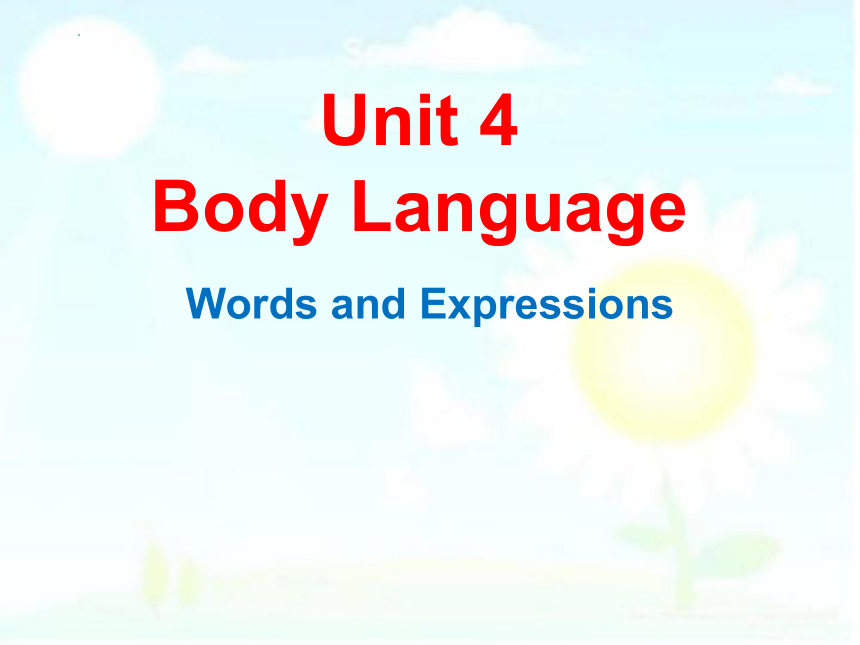 | |
| 格式 | pptx | ||
| 文件大小 | 477.9KB | ||
| 资源类型 | 教案 | ||
| 版本资源 | 人教版(2019) | ||
| 科目 | 英语 | ||
| 更新时间 | 2022-10-27 11:48:17 | ||
图片预览

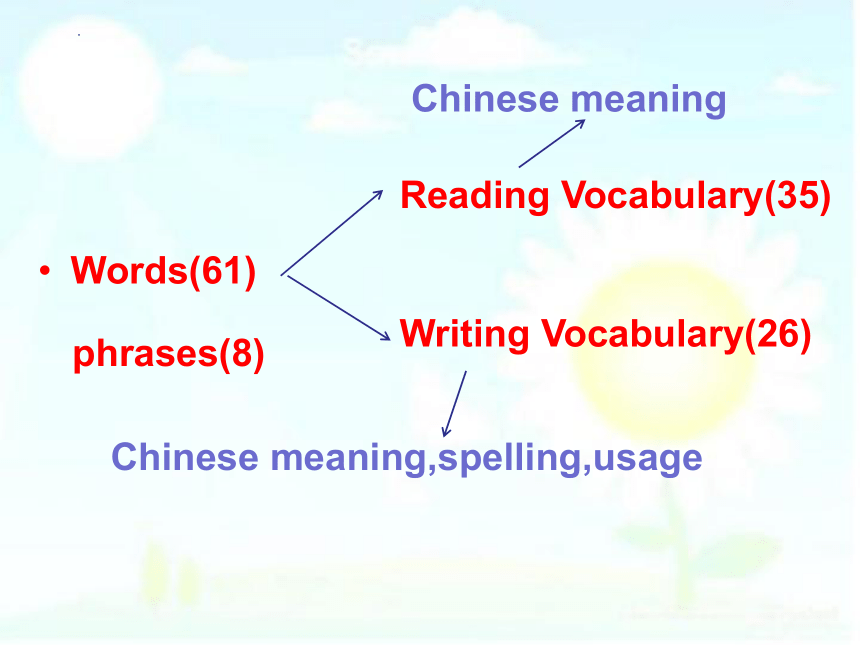
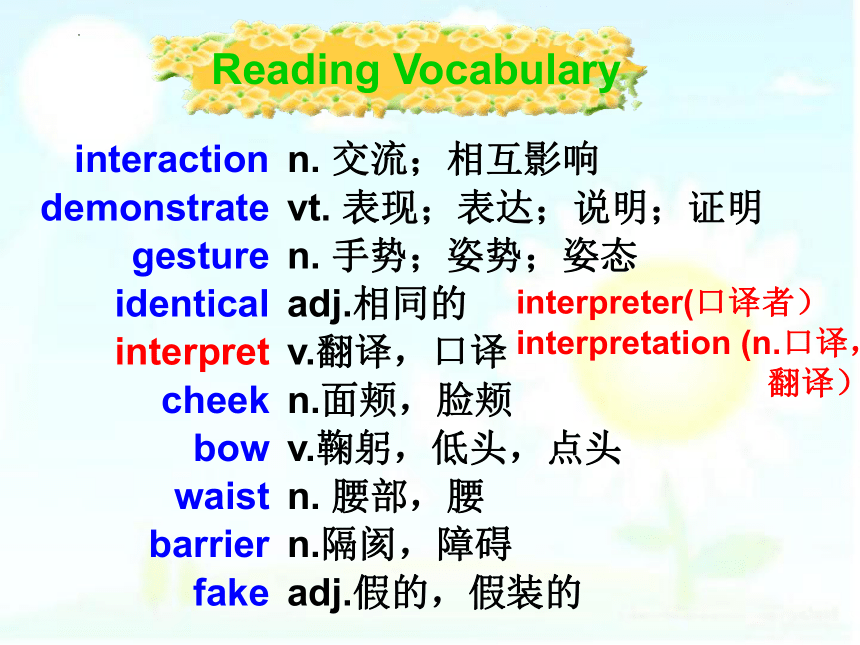

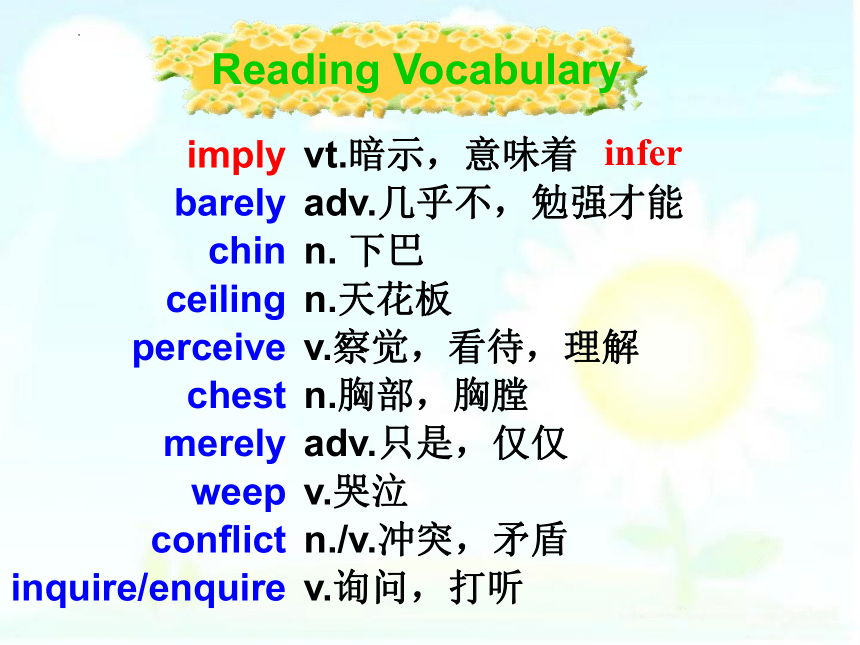
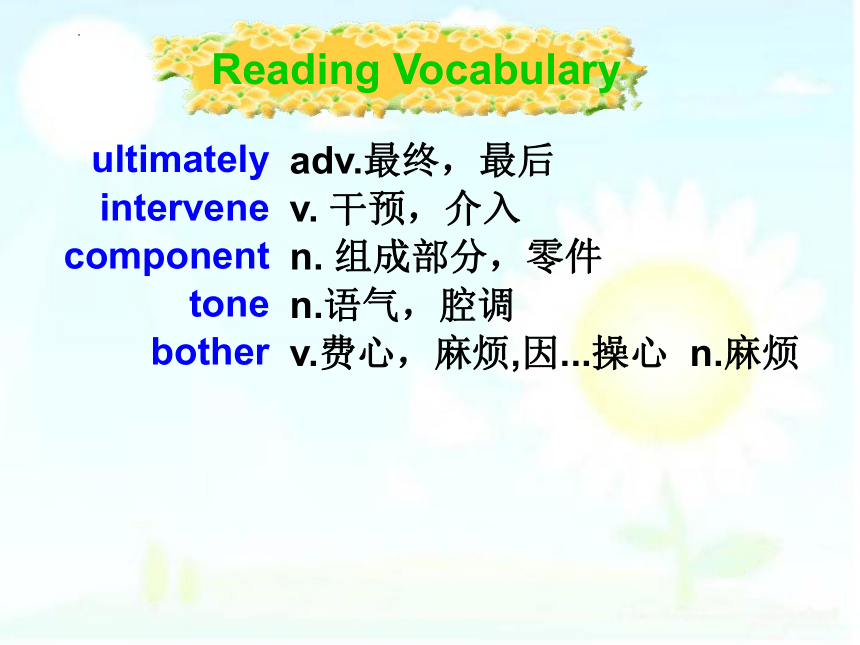
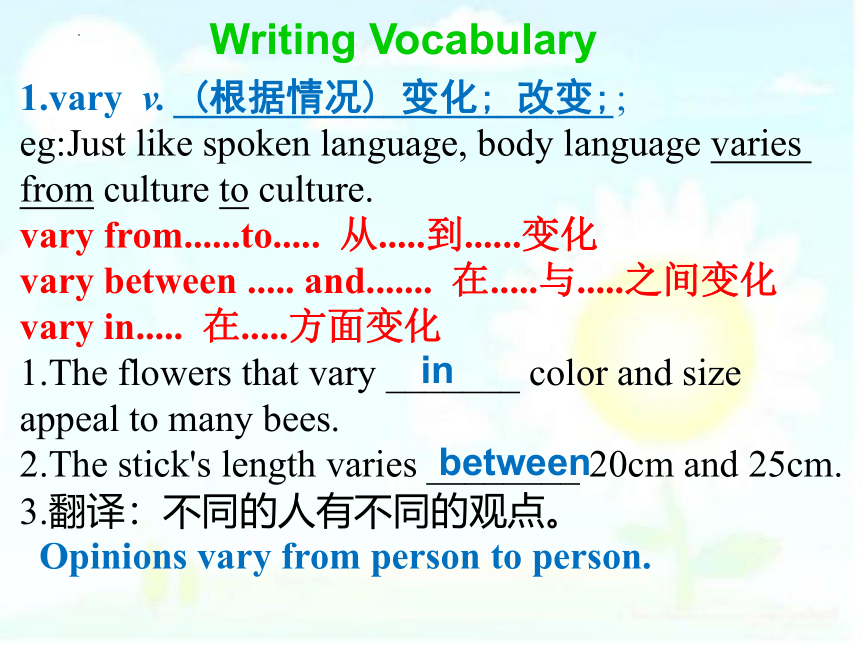
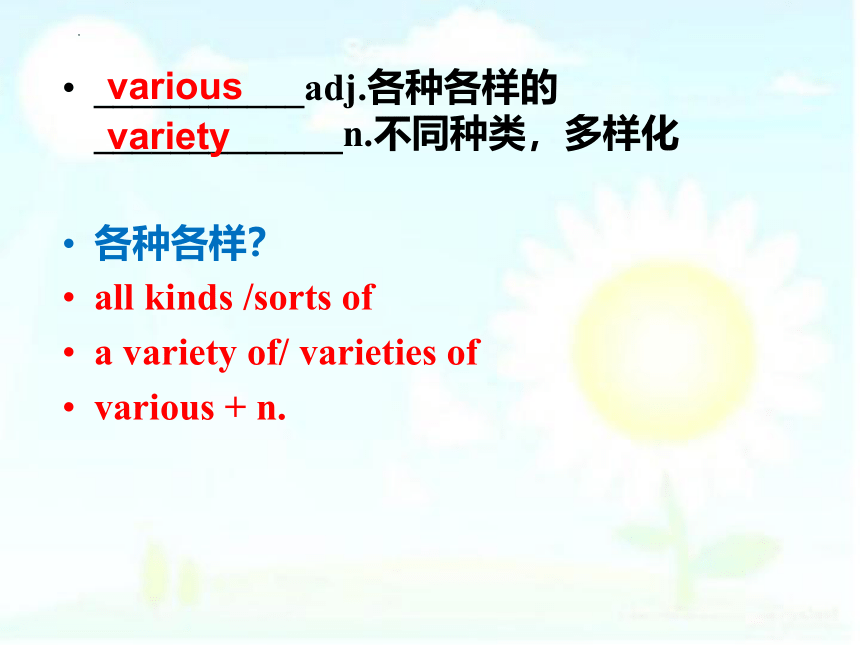
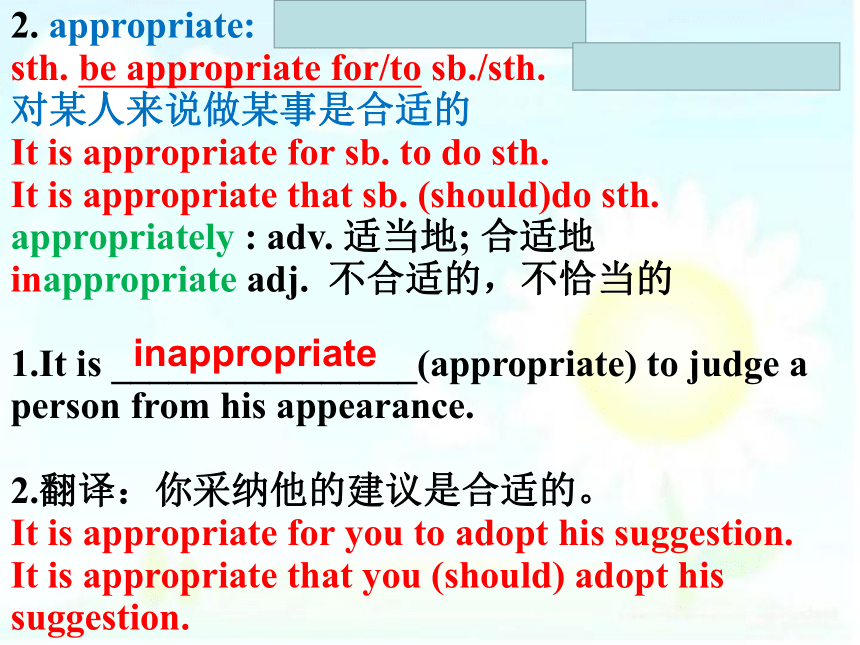
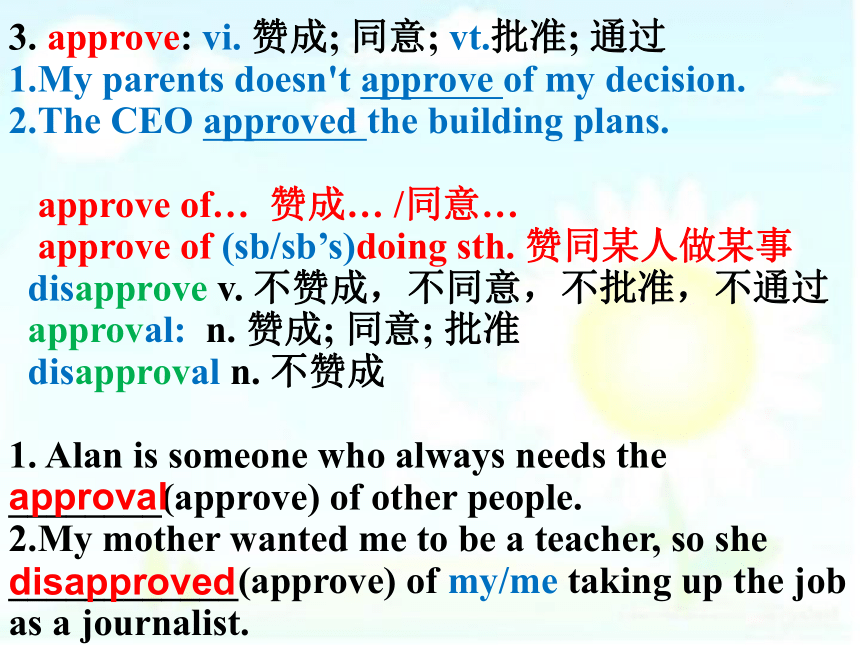
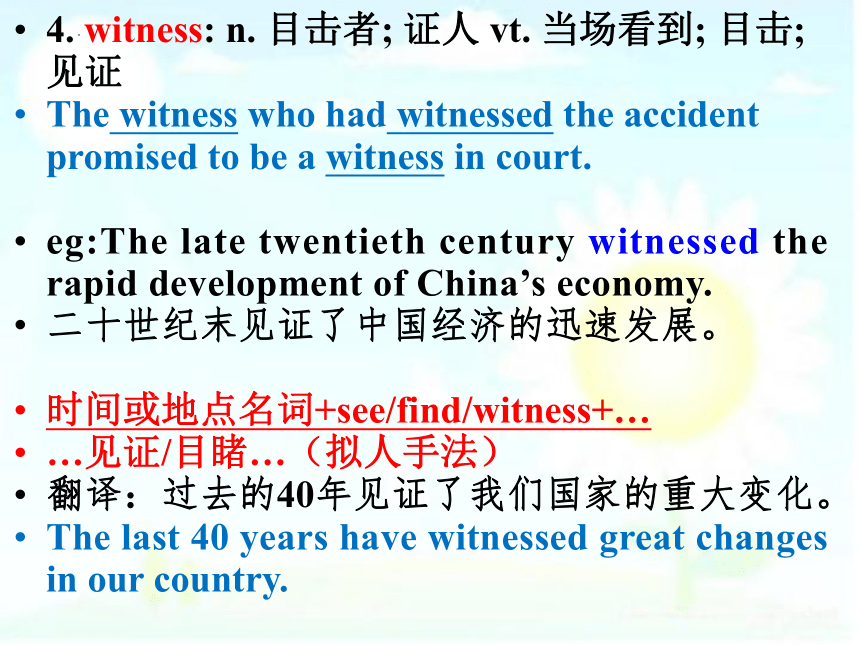
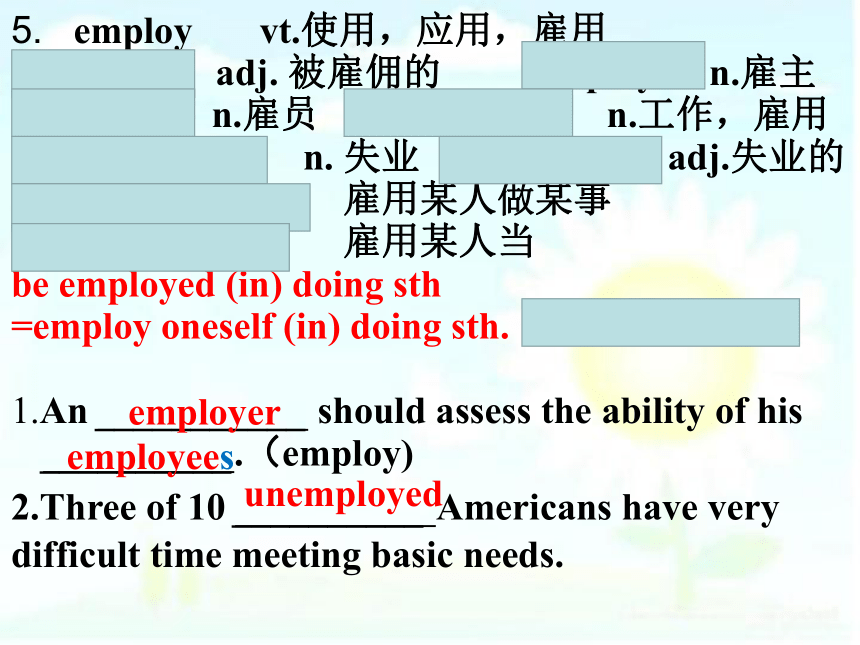
文档简介
(共37张PPT)
Unit 4
Body Language
Words and Expressions
Words(61)
Reading Vocabulary(35)
Writing Vocabulary(26)
Chinese meaning
Chinese meaning,spelling,usage
phrases(8)
interaction
demonstrate
gesture
identical
interpret
cheek
bow
waist
barrier
fake
Reading Vocabulary
n. 交流;相互影响
vt. 表现;表达;说明;证明
n. 手势;姿势;姿态
adj.相同的
v.翻译,口译
n.面颊,脸颊
v.鞠躬,低头,点头
n. 腰部,腰
n.隔阂,障碍
adj.假的,假装的
interpreter(口译者)
interpretation (n.口译,
翻译)
incident
trial
twin
nonverbal
internal
slump
pose
reveal
tick
lower
Reading Vocabulary
n. 严重的事件,发生的事件
n./v.审讯,试验
n. /adj.双胞胎之一(的)
adj.不涉及言语的,非言语的
adj.内部的,里面的
vi.垂头弯腰地走或坐
n.姿势v.摆姿势
vt.揭示,显示
v.打钩,(钟表)发出滴答声n.钩号
vt.降低,放低 adj.下面的
external
(adj.外部的)
imply
barely
chin
ceiling
perceive
chest
merely
weep
conflict
inquire/enquire
Reading Vocabulary
vt.暗示,意味着
adv.几乎不,勉强才能
n. 下巴
n.天花板
v.察觉,看待,理解
n.胸部,胸膛
adv.只是,仅仅
v.哭泣
n./v.冲突,矛盾
v.询问,打听
infer
ultimately
intervene
component
tone
bother
Reading Vocabulary
adv.最终,最后
v. 干预,介入
n. 组成部分,零件
n.语气,腔调
v.费心,麻烦,因...操心 n.麻烦
Writing Vocabulary
1.vary v. _______________________;
eg:Just like spoken language, body language varies
from culture to culture.
vary from......to..... 从.....到......变化
vary between ..... and....... 在.....与.....之间变化
vary in..... 在.....方面变化
1.The flowers that vary _______ color and size
appeal to many bees.
2.The stick's length varies ________ 20cm and 25cm.
3.翻译:不同的人有不同的观点。
Opinions vary from person to person.
(根据情况) 变化; 改变;
in
between
___________adj.各种各样的 _____________n.不同种类,多样化
各种各样?
all kinds /sorts of
a variety of/ varieties of
various + n.
various
variety
2. appropriate: adj. 合适的; 恰当
sth. be appropriate for/to sb./sth. 适用于,合乎
对某人来说做某事是合适的
It is appropriate for sb. to do sth.
It is appropriate that sb. (should)do sth.
appropriately : adv. 适当地; 合适地
inappropriate adj. 不合适的,不恰当的
1.It is ________________(appropriate) to judge a person from his appearance.
2.翻译:你采纳他的建议是合适的。
It is appropriate for you to adopt his suggestion.
It is appropriate that you (should) adopt his suggestion.
inappropriate
3. approve: vi. 赞成; 同意; vt.批准; 通过
1.My parents doesn't approve of my decision.
2.The CEO approved the building plans.
approve of… 赞成… /同意…
approve of (sb/sb’s)doing sth. 赞同某人做某事
disapprove v. 不赞成,不同意,不批准,不通过
approval: n. 赞成; 同意; 批准
disapproval n. 不赞成
1. Alan is someone who always needs the ________(approve) of other people.
2.My mother wanted me to be a teacher, so she ____________(approve) of my/me taking up the job as a journalist.
approval
disapproved
4. witness: n. 目击者; 证人 vt. 当场看到; 目击; 见证
The witness who had witnessed the accident promised to be a witness in court.
eg:The late twentieth century witnessed the rapid development of China’s economy.
二十世纪末见证了中国经济的迅速发展。
时间或地点名词+see/find/witness+…
…见证/目睹…(拟人手法)
翻译:过去的40年见证了我们国家的重大变化。
The last 40 years have witnessed great changes in our country.
5. employ vt.使用,应用,雇用
employed adj. 被雇佣的 employer n.雇主
employee n.雇员 employment n.工作,雇用
unemployment n. 失业 unemployed adj.失业的
employ sb to do... 雇用某人做某事
employ sb as... 雇用某人当
be employed (in) doing sth
=employ oneself (in) doing sth. 忙于做某事
1.An ___________ should assess the ability of his __________.(employ)
2.Three of 10 __________ Americans have very difficult time meeting basic needs.
employer
employees
unemployed
employ sb to do... 雇用某人做某事
employ sb as... 雇用某人当
be employed (in) doing sth
=employ oneself (in) doing sth. 忙于做某事
3.翻译:
他忙于为自己制定学习计划。
很多人被雇佣来处理这项工作。
他妈妈受雇当售货员。
He is employed in making a learning plan for himself.
He employs himself in making a learning plan.
Many people have been employed to deal with
the work.
His mother was employed as a shop assistant.
6. differ: vi. 相异; 不同于
different adj. 不同的
differently adv. 不同地
difference n. 不同; 差异
indifferent adj.漠不关心的
differ from… 不同于=be different from
differ in… 在…方面不同=be different in
make a difference to sth. 对…有意义,起作用
翻译:这对双胞胎在性格方面不一样。
The twins differ from each other in character.
7. favour vt. 较喜欢;选择;有利于
n. 帮助;恩惠;赞同
favourable adj. 赞同的,有利的
favourite adj.特别喜欢的 n. 喜欢的人/物
favour doing sth 喜欢做某事
ask sb a favour = ask a favor of sb 请某人帮忙
do sb a favour = do a favour for sb 帮某人忙
in favour of... 同意...;支持...;赞成...
1.My sister was against my suggestion while my brother was ______________(赞成) it.
2.Could you _______________(帮我个忙) and pick up Sam from school today
in favour of
do me a favour
8.anger n.愤怒;怒气 vt. 使生气;激怒
angry adj. 愤怒的,生气的 angrily adv.
to one’s anger 使某人气愤的是
be angry with sb.about sth. 因…而生某人的气
9.reliable adj. 可靠的;可信赖的
unreliable adj. 不可靠的
rely vi. 信赖,可靠
rely on = depend on 依赖,依靠,指望
10.bend vt.&v.(使)弯曲;倾斜;偏向 n.拐弯处; 弯曲
bend ---_______----_________
bend the truth 歪曲事实
at the bend 在拐弯处
bent
bent
11. clarify vt. 使更清晰易懂;阐明;澄清
clarify one's position/stand 阐明某人的立场
clarify matters 澄清真相
clarification n. 澄清;阐明
---ify 使变成.....
simplify purify beautify
简化 净化 美化
12. educator n.教师;教育工作者;教育家 educate vt. 教育; 培养; 训练
education n. 教育
educated adj.有教养的,受过良好教育的
13.tendency n. 趋势;倾向 tend v. 趋向,照料
have a tendency to do sth. 有做某事的倾向
=tend to do sth.
翻译:我紧张时总会说很多话。
I have a tendency to talk too much when I am too nervous.
I tend to talk too much when I am too nervous.
14. stare vi. 盯着看;凝视 n. 凝视
stare at... 盯着看; 凝视 glare at... 怒视; 瞪眼
glance at… 看一眼 look at... 看
15. occupy vt. 占据;占用
(1)occupy oneself with sth./(in) doing sth.
=be occupied with sth./ (in) doing sth.
忙于做某事
“忙于做某事”的其他表达方式有
be busy with sth./(in) doing sth.,
be employed with sth./(in) doing sth.
employ oneself with sth./(in) doing sth.
be engaged in (doing)sth.
(2)occupied adj. 忙于……的,被占用的,被占领的
(3)occupation n. 占领; 职业;工作
1)During the war their lands _____________by the enemy.
2)The large bed _______ most of the room.
3)With the college entrance examination drawing near, I am occupied _____ preparing for it.
4)He would have attended your birthday party but he occupied himself ____ a very important experiment.
5)The __________(occupy) occupied most of her time, thus leaving her least time for her family.
6)I have been so ________ with work that I haven’t had time for social activities.
were occupied
occupies
in
with
occupation
occupied
16. distract vt. 分散(注意力);使分心
distract sb./sth. from sth.
使某人某物从...中分心;使某人/某物不能专心于某事
distracted adj.注意力分散的;思想不集中的
distraction n. 使人分心的事; 娱乐;消遣
1. The teacher is always reminding the ____________(distract) students that they need to pay attention in class.
2. Let's invite her to the disco — she needs ____________(distract).
3.Jack admits that playing video games sometimes_____________________________.(使他做作业分心)
distracts him from his homework
distracted
distraction
17. distinguish vi.&vt. 区分;辨别
(1)distinguish between ...and ... (辨别...和……)
distinguish ... from ... (把……与……区分开)
翻译:
1.阅读好书不仅可以拓宽我们的视野,还可以教我们明辨是非。
Reading good books can not only broaden our horizons but also teach us to distinguish between right and wrong.
2.很难分辨一对双胞胎谁是谁。
It is hard to distinguish one twin from the other.
(2)distinguished adj. 卓越的;著名的;杰出的
因……而出名 be distinguished/famous for..
作为……而出名 be distinguished/famous as...
为....所熟知 be distinguished/famous to....
如何改写成倒装句?
Not only can reading good books
broaden......but also it teaches us....
18. anxiety n. 焦虑; 担心; 害怕;渴望
anxious adj. 担忧的; 担心的; 渴望的
anxiously adv. 焦急地; 忧虑地
be anxious about sth. 担心...
be anxious for sth. 渴望得到某物
19. react vi.
(对…)起反应;回应;(对食物等) 有不良反应
react to... 对…做出反应,回应
reaction n. 反应
20. embarrassed adj. 难堪的;尴尬的
embarrassing adj. 令人尴尬的,
embarrass vt. 使尴尬
embarrassment n. 尴尬
be embarrassed at/about... 因......而尴尬
to one's embarrassment 令某人尴尬的是
1) She was ___________ about her weight and decided to lose it.
2)The __________ look on his face suggested he was in an ____________ situation.
3.To his _____________, he couldn't answer the simple question.
embarrassed
embarrassed
embarrassing
embarrassment
21. ashamed adj. 羞愧; 惭愧
be ashamed of sth/to do sth/ that+从句
shame n. 羞耻; 羞愧; 惭愧; 羞耻心
v. 使羞愧/惭愧; 使丢脸
to one’s shame 令某人惭愧的是
It is a shame that ..... 真可惜,真惭愧
shameful adj. 可耻的; 丢脸的
shameless adj. 不知廉耻的,无耻的
1) As a boy, I______________________(不好意思说)that I have a preference for pink.
2)You should be ashamed of your __________(shame) behaviour at the opening ceremony.
am ashamed to say
shamful
7. adjust vt. 调整;调节 vi. & vt. 适应;(使)习惯
22. adjust vt.调整;调节 vi. 适应;(使)习惯
(1)adjust to (doing) sth... 适应……
adjust oneself to (doing) sth 使自己适应……
(2)adjustment n. 调整;调节
make an adjustment to 对……进行调整
(3)adjustable adj. 可调节的;可调整的
7. adjust vt. 调整;调节 vi. & vt. 适应;(使)习惯
单句语法填空
①This kind of desk can ___________ (adjust) to the height you need.Besides, it's not expensive at all.
②Mother was worried about whether she could adjust to ______ (live) in the mountain village alone.
③Some schools will have to make an ___________ (adjust) in agreement with the national soccer reform.
④_________ (adjust) to the tropical heat was more difficult than they had expected.
be adjusted
living
adjustment
Adjusting
Revision
20. __________ n. 交流;相互影响→________ v. 交流;相互影响
21. ________ vi. (根据情况)变化;改变→________ adj. 各种各样的→________ n. 不同种类;变化
22. ________ vi. 赞成;同意 vt. 批准;通过→________ n. 赞成;同意→v._______不赞成
interaction
interact
vary
various
variety
approve
approval
disapprove
employ
employer
employee
employment
differ
different
difference
anger
angry
reliable
rely
slight
slightly
assess
assessment
educator
educate
education
educated
barely
bare
occupy
occupied
occupation
anxiety
anxious
embarrassed
embarrassing
embarrassment
ashamed
shame
react
reaction
Part 2核心短语·闪记
1. __________ 相比之下
2. _____________ (与……)相比较
3. ______________ 推理; 推断
4. ___________ 消除; 分解; 打破
5. ____________ 直起来; 整理; 收拾整齐
6. _____________ 换句话说; 也就是说
7. ______ (短暂地)访问; 要求(某人讲话等); 正式邀请
8. _______ 有某种影响; 在工作
by contrast
by comparison
make inferences
break down
straighten up
in other words
call on
(be) at work
Noun Verb Adjective Adverb
differ
vary
rely
interact
approve
embarrass
P40 Fill in the table with different forms of the words. Refer to a dictionary if necessary.
difference
different
differently
variety
various
variously
reliability
reliable
reliably
interaction
interactive
interactively
approval
approved/approving
approvingly
embarrassment
embarrassed
embarrassing
embarrassedly
embarrassingly
P40 Work out the meanings of the underlined words in the sentences below. In pairs, list more words of the same kind.
1. I rest my head on the desk to get some rest.
2. The child displayed great interest in the huge fireworks display.
3. Most students favour the plan, while their teachers are not in favour of it.
4. Jeremy witnessed the whole incident and was expected to be the key witness at the trial.
5. His lack of eye contact when talking with people shows that he lacks confidence.
6. When he noticed a slight frown on his twin sister's face, he frowned as well.
v. 依靠
n. 休息
n. 表演
v. 显露
v. 较喜欢
n. 赞同,支持
v. 目睹
n. 目击者
n. 缺乏
v. 缺乏,不足
n. 皱眉
v. 皱眉
When we think about nonverbal behaviour, or body language, we think about communication. When we think about communication, we think about __________. So what is our body language _____________ to others Social scientists have spent a lot of time looking at the effects of our body language. We make assessments and inferences from body language.
P40 Read the passage about body language. Fill in the blanks with the correct forms of the words and phrases in the box.
interaction
by contrast, by comparison, break down, interaction, demonstrate, approve of, clue,gesture
demonstrating
And according to those judgements we __________ one person and dislike another. So body language provides external _______ that are influenced by internal thoughts and feelings. Scientists have found that when we feel proud and powerful, we usually straighten up to make ourselves bigger. __________, when we feel powerless, we tend to slump, making ourselves smaller. It is obvious that our minds can influence our bodies. But is it also true that our bodies can affect our minds Scientific experiments show that if we make powerful __________ long enough, we may actually feel more powerful. People who remember to use positive body language are more likely to feel positive _____________, so some scientists suggest that we use our bodies to try power posing to help ___________ our feelings of shyness and powerlessness.
approve of
clues
By contrast
by contrast, by comparison, break down, clue, interaction, demonstrate, approve of, gesture
gestures
by comparison
break down
P 82 Ex3.
1.perceive
2.lean
3.comparison
4.lowered
5.elsewhere
6.attracted
7.identify
8.assess
Unit 4
Body Language
Words and Expressions
Words(61)
Reading Vocabulary(35)
Writing Vocabulary(26)
Chinese meaning
Chinese meaning,spelling,usage
phrases(8)
interaction
demonstrate
gesture
identical
interpret
cheek
bow
waist
barrier
fake
Reading Vocabulary
n. 交流;相互影响
vt. 表现;表达;说明;证明
n. 手势;姿势;姿态
adj.相同的
v.翻译,口译
n.面颊,脸颊
v.鞠躬,低头,点头
n. 腰部,腰
n.隔阂,障碍
adj.假的,假装的
interpreter(口译者)
interpretation (n.口译,
翻译)
incident
trial
twin
nonverbal
internal
slump
pose
reveal
tick
lower
Reading Vocabulary
n. 严重的事件,发生的事件
n./v.审讯,试验
n. /adj.双胞胎之一(的)
adj.不涉及言语的,非言语的
adj.内部的,里面的
vi.垂头弯腰地走或坐
n.姿势v.摆姿势
vt.揭示,显示
v.打钩,(钟表)发出滴答声n.钩号
vt.降低,放低 adj.下面的
external
(adj.外部的)
imply
barely
chin
ceiling
perceive
chest
merely
weep
conflict
inquire/enquire
Reading Vocabulary
vt.暗示,意味着
adv.几乎不,勉强才能
n. 下巴
n.天花板
v.察觉,看待,理解
n.胸部,胸膛
adv.只是,仅仅
v.哭泣
n./v.冲突,矛盾
v.询问,打听
infer
ultimately
intervene
component
tone
bother
Reading Vocabulary
adv.最终,最后
v. 干预,介入
n. 组成部分,零件
n.语气,腔调
v.费心,麻烦,因...操心 n.麻烦
Writing Vocabulary
1.vary v. _______________________;
eg:Just like spoken language, body language varies
from culture to culture.
vary from......to..... 从.....到......变化
vary between ..... and....... 在.....与.....之间变化
vary in..... 在.....方面变化
1.The flowers that vary _______ color and size
appeal to many bees.
2.The stick's length varies ________ 20cm and 25cm.
3.翻译:不同的人有不同的观点。
Opinions vary from person to person.
(根据情况) 变化; 改变;
in
between
___________adj.各种各样的 _____________n.不同种类,多样化
各种各样?
all kinds /sorts of
a variety of/ varieties of
various + n.
various
variety
2. appropriate: adj. 合适的; 恰当
sth. be appropriate for/to sb./sth. 适用于,合乎
对某人来说做某事是合适的
It is appropriate for sb. to do sth.
It is appropriate that sb. (should)do sth.
appropriately : adv. 适当地; 合适地
inappropriate adj. 不合适的,不恰当的
1.It is ________________(appropriate) to judge a person from his appearance.
2.翻译:你采纳他的建议是合适的。
It is appropriate for you to adopt his suggestion.
It is appropriate that you (should) adopt his suggestion.
inappropriate
3. approve: vi. 赞成; 同意; vt.批准; 通过
1.My parents doesn't approve of my decision.
2.The CEO approved the building plans.
approve of… 赞成… /同意…
approve of (sb/sb’s)doing sth. 赞同某人做某事
disapprove v. 不赞成,不同意,不批准,不通过
approval: n. 赞成; 同意; 批准
disapproval n. 不赞成
1. Alan is someone who always needs the ________(approve) of other people.
2.My mother wanted me to be a teacher, so she ____________(approve) of my/me taking up the job as a journalist.
approval
disapproved
4. witness: n. 目击者; 证人 vt. 当场看到; 目击; 见证
The witness who had witnessed the accident promised to be a witness in court.
eg:The late twentieth century witnessed the rapid development of China’s economy.
二十世纪末见证了中国经济的迅速发展。
时间或地点名词+see/find/witness+…
…见证/目睹…(拟人手法)
翻译:过去的40年见证了我们国家的重大变化。
The last 40 years have witnessed great changes in our country.
5. employ vt.使用,应用,雇用
employed adj. 被雇佣的 employer n.雇主
employee n.雇员 employment n.工作,雇用
unemployment n. 失业 unemployed adj.失业的
employ sb to do... 雇用某人做某事
employ sb as... 雇用某人当
be employed (in) doing sth
=employ oneself (in) doing sth. 忙于做某事
1.An ___________ should assess the ability of his __________.(employ)
2.Three of 10 __________ Americans have very difficult time meeting basic needs.
employer
employees
unemployed
employ sb to do... 雇用某人做某事
employ sb as... 雇用某人当
be employed (in) doing sth
=employ oneself (in) doing sth. 忙于做某事
3.翻译:
他忙于为自己制定学习计划。
很多人被雇佣来处理这项工作。
他妈妈受雇当售货员。
He is employed in making a learning plan for himself.
He employs himself in making a learning plan.
Many people have been employed to deal with
the work.
His mother was employed as a shop assistant.
6. differ: vi. 相异; 不同于
different adj. 不同的
differently adv. 不同地
difference n. 不同; 差异
indifferent adj.漠不关心的
differ from… 不同于=be different from
differ in… 在…方面不同=be different in
make a difference to sth. 对…有意义,起作用
翻译:这对双胞胎在性格方面不一样。
The twins differ from each other in character.
7. favour vt. 较喜欢;选择;有利于
n. 帮助;恩惠;赞同
favourable adj. 赞同的,有利的
favourite adj.特别喜欢的 n. 喜欢的人/物
favour doing sth 喜欢做某事
ask sb a favour = ask a favor of sb 请某人帮忙
do sb a favour = do a favour for sb 帮某人忙
in favour of... 同意...;支持...;赞成...
1.My sister was against my suggestion while my brother was ______________(赞成) it.
2.Could you _______________(帮我个忙) and pick up Sam from school today
in favour of
do me a favour
8.anger n.愤怒;怒气 vt. 使生气;激怒
angry adj. 愤怒的,生气的 angrily adv.
to one’s anger 使某人气愤的是
be angry with sb.about sth. 因…而生某人的气
9.reliable adj. 可靠的;可信赖的
unreliable adj. 不可靠的
rely vi. 信赖,可靠
rely on = depend on 依赖,依靠,指望
10.bend vt.&v.(使)弯曲;倾斜;偏向 n.拐弯处; 弯曲
bend ---_______----_________
bend the truth 歪曲事实
at the bend 在拐弯处
bent
bent
11. clarify vt. 使更清晰易懂;阐明;澄清
clarify one's position/stand 阐明某人的立场
clarify matters 澄清真相
clarification n. 澄清;阐明
---ify 使变成.....
simplify purify beautify
简化 净化 美化
12. educator n.教师;教育工作者;教育家 educate vt. 教育; 培养; 训练
education n. 教育
educated adj.有教养的,受过良好教育的
13.tendency n. 趋势;倾向 tend v. 趋向,照料
have a tendency to do sth. 有做某事的倾向
=tend to do sth.
翻译:我紧张时总会说很多话。
I have a tendency to talk too much when I am too nervous.
I tend to talk too much when I am too nervous.
14. stare vi. 盯着看;凝视 n. 凝视
stare at... 盯着看; 凝视 glare at... 怒视; 瞪眼
glance at… 看一眼 look at... 看
15. occupy vt. 占据;占用
(1)occupy oneself with sth./(in) doing sth.
=be occupied with sth./ (in) doing sth.
忙于做某事
“忙于做某事”的其他表达方式有
be busy with sth./(in) doing sth.,
be employed with sth./(in) doing sth.
employ oneself with sth./(in) doing sth.
be engaged in (doing)sth.
(2)occupied adj. 忙于……的,被占用的,被占领的
(3)occupation n. 占领; 职业;工作
1)During the war their lands _____________by the enemy.
2)The large bed _______ most of the room.
3)With the college entrance examination drawing near, I am occupied _____ preparing for it.
4)He would have attended your birthday party but he occupied himself ____ a very important experiment.
5)The __________(occupy) occupied most of her time, thus leaving her least time for her family.
6)I have been so ________ with work that I haven’t had time for social activities.
were occupied
occupies
in
with
occupation
occupied
16. distract vt. 分散(注意力);使分心
distract sb./sth. from sth.
使某人某物从...中分心;使某人/某物不能专心于某事
distracted adj.注意力分散的;思想不集中的
distraction n. 使人分心的事; 娱乐;消遣
1. The teacher is always reminding the ____________(distract) students that they need to pay attention in class.
2. Let's invite her to the disco — she needs ____________(distract).
3.Jack admits that playing video games sometimes_____________________________.(使他做作业分心)
distracts him from his homework
distracted
distraction
17. distinguish vi.&vt. 区分;辨别
(1)distinguish between ...and ... (辨别...和……)
distinguish ... from ... (把……与……区分开)
翻译:
1.阅读好书不仅可以拓宽我们的视野,还可以教我们明辨是非。
Reading good books can not only broaden our horizons but also teach us to distinguish between right and wrong.
2.很难分辨一对双胞胎谁是谁。
It is hard to distinguish one twin from the other.
(2)distinguished adj. 卓越的;著名的;杰出的
因……而出名 be distinguished/famous for..
作为……而出名 be distinguished/famous as...
为....所熟知 be distinguished/famous to....
如何改写成倒装句?
Not only can reading good books
broaden......but also it teaches us....
18. anxiety n. 焦虑; 担心; 害怕;渴望
anxious adj. 担忧的; 担心的; 渴望的
anxiously adv. 焦急地; 忧虑地
be anxious about sth. 担心...
be anxious for sth. 渴望得到某物
19. react vi.
(对…)起反应;回应;(对食物等) 有不良反应
react to... 对…做出反应,回应
reaction n. 反应
20. embarrassed adj. 难堪的;尴尬的
embarrassing adj. 令人尴尬的,
embarrass vt. 使尴尬
embarrassment n. 尴尬
be embarrassed at/about... 因......而尴尬
to one's embarrassment 令某人尴尬的是
1) She was ___________ about her weight and decided to lose it.
2)The __________ look on his face suggested he was in an ____________ situation.
3.To his _____________, he couldn't answer the simple question.
embarrassed
embarrassed
embarrassing
embarrassment
21. ashamed adj. 羞愧; 惭愧
be ashamed of sth/to do sth/ that+从句
shame n. 羞耻; 羞愧; 惭愧; 羞耻心
v. 使羞愧/惭愧; 使丢脸
to one’s shame 令某人惭愧的是
It is a shame that ..... 真可惜,真惭愧
shameful adj. 可耻的; 丢脸的
shameless adj. 不知廉耻的,无耻的
1) As a boy, I______________________(不好意思说)that I have a preference for pink.
2)You should be ashamed of your __________(shame) behaviour at the opening ceremony.
am ashamed to say
shamful
7. adjust vt. 调整;调节 vi. & vt. 适应;(使)习惯
22. adjust vt.调整;调节 vi. 适应;(使)习惯
(1)adjust to (doing) sth... 适应……
adjust oneself to (doing) sth 使自己适应……
(2)adjustment n. 调整;调节
make an adjustment to 对……进行调整
(3)adjustable adj. 可调节的;可调整的
7. adjust vt. 调整;调节 vi. & vt. 适应;(使)习惯
单句语法填空
①This kind of desk can ___________ (adjust) to the height you need.Besides, it's not expensive at all.
②Mother was worried about whether she could adjust to ______ (live) in the mountain village alone.
③Some schools will have to make an ___________ (adjust) in agreement with the national soccer reform.
④_________ (adjust) to the tropical heat was more difficult than they had expected.
be adjusted
living
adjustment
Adjusting
Revision
20. __________ n. 交流;相互影响→________ v. 交流;相互影响
21. ________ vi. (根据情况)变化;改变→________ adj. 各种各样的→________ n. 不同种类;变化
22. ________ vi. 赞成;同意 vt. 批准;通过→________ n. 赞成;同意→v._______不赞成
interaction
interact
vary
various
variety
approve
approval
disapprove
employ
employer
employee
employment
differ
different
difference
anger
angry
reliable
rely
slight
slightly
assess
assessment
educator
educate
education
educated
barely
bare
occupy
occupied
occupation
anxiety
anxious
embarrassed
embarrassing
embarrassment
ashamed
shame
react
reaction
Part 2核心短语·闪记
1. __________ 相比之下
2. _____________ (与……)相比较
3. ______________ 推理; 推断
4. ___________ 消除; 分解; 打破
5. ____________ 直起来; 整理; 收拾整齐
6. _____________ 换句话说; 也就是说
7. ______ (短暂地)访问; 要求(某人讲话等); 正式邀请
8. _______ 有某种影响; 在工作
by contrast
by comparison
make inferences
break down
straighten up
in other words
call on
(be) at work
Noun Verb Adjective Adverb
differ
vary
rely
interact
approve
embarrass
P40 Fill in the table with different forms of the words. Refer to a dictionary if necessary.
difference
different
differently
variety
various
variously
reliability
reliable
reliably
interaction
interactive
interactively
approval
approved/approving
approvingly
embarrassment
embarrassed
embarrassing
embarrassedly
embarrassingly
P40 Work out the meanings of the underlined words in the sentences below. In pairs, list more words of the same kind.
1. I rest my head on the desk to get some rest.
2. The child displayed great interest in the huge fireworks display.
3. Most students favour the plan, while their teachers are not in favour of it.
4. Jeremy witnessed the whole incident and was expected to be the key witness at the trial.
5. His lack of eye contact when talking with people shows that he lacks confidence.
6. When he noticed a slight frown on his twin sister's face, he frowned as well.
v. 依靠
n. 休息
n. 表演
v. 显露
v. 较喜欢
n. 赞同,支持
v. 目睹
n. 目击者
n. 缺乏
v. 缺乏,不足
n. 皱眉
v. 皱眉
When we think about nonverbal behaviour, or body language, we think about communication. When we think about communication, we think about __________. So what is our body language _____________ to others Social scientists have spent a lot of time looking at the effects of our body language. We make assessments and inferences from body language.
P40 Read the passage about body language. Fill in the blanks with the correct forms of the words and phrases in the box.
interaction
by contrast, by comparison, break down, interaction, demonstrate, approve of, clue,gesture
demonstrating
And according to those judgements we __________ one person and dislike another. So body language provides external _______ that are influenced by internal thoughts and feelings. Scientists have found that when we feel proud and powerful, we usually straighten up to make ourselves bigger. __________, when we feel powerless, we tend to slump, making ourselves smaller. It is obvious that our minds can influence our bodies. But is it also true that our bodies can affect our minds Scientific experiments show that if we make powerful __________ long enough, we may actually feel more powerful. People who remember to use positive body language are more likely to feel positive _____________, so some scientists suggest that we use our bodies to try power posing to help ___________ our feelings of shyness and powerlessness.
approve of
clues
By contrast
by contrast, by comparison, break down, clue, interaction, demonstrate, approve of, gesture
gestures
by comparison
break down
P 82 Ex3.
1.perceive
2.lean
3.comparison
4.lowered
5.elsewhere
6.attracted
7.identify
8.assess
